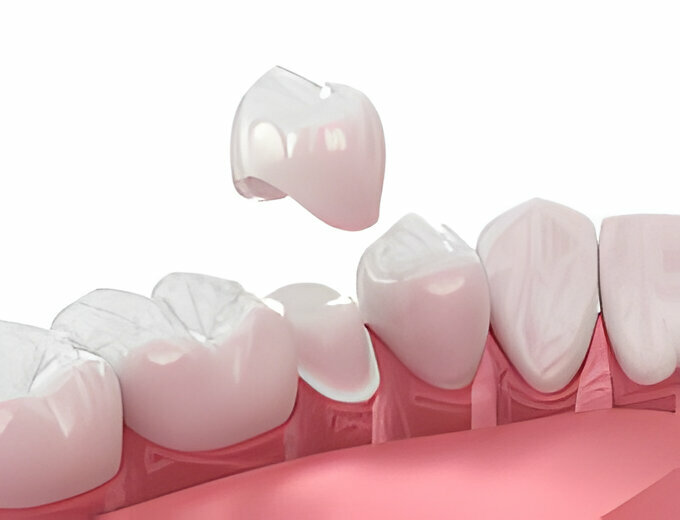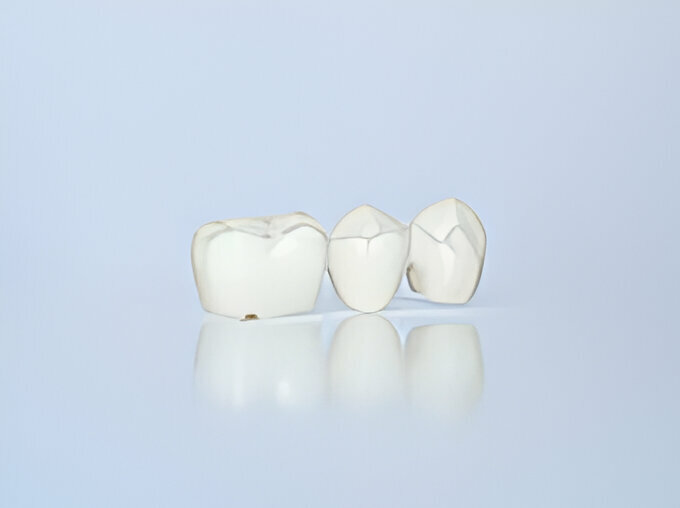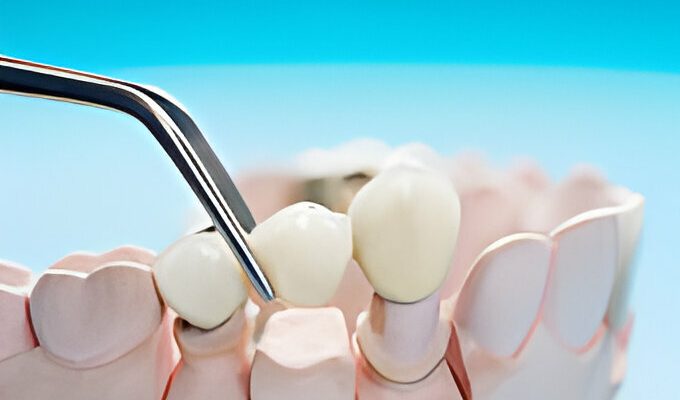Summary:
Our teeth experience daily wear and tear. They initially begin with minor decay, which leads to the spread of infection and, ultimately, tooth loss.
To prevent further damage, you must protect your teeth during the initial stage of decay. One effective way to do so is to use dental crowns to preserve natural teeth.

Like fillings, oral crowns can restore oral health and give you a complete smile makeover.
However, there’s still much confusion around dental crowns, which makes people avoid obtaining dental crowns. Keeping that in mind, we shall delve into topics like:
- Dental Crowns x Modern Dental Prosthetics
- Types Of Crowns – Innovation In Dental Restorations
- A Detailed Description Of The Procedure For Getting Dental Crowns
Continue reading as we understand the procedure of getting caps in the following sections.
Dental Crowns x Modern Dental Prosthetics
Improper and irregular oral hygiene is primarily the culprit for damaged and decayed teeth (among other reasons). However, these are some of the common problems which can be easily fixed via dental prosthetics.
Crowns are commonly employed to address extensive decay, fractures, large fillings, and cap or anchor implants or bridges. In addition to improving oral aesthetics, oral caps offer functional benefits by enhancing bite alignment and safeguarding weakened teeth against further damage.
Role of Crowns in Smile Dentistry & Aesthetics
Dental crowns in West Columbia, SC, are imperative to preserve teeth among various treatment options. These appliances serve as a protective cover for damaged or weakened teeth, aiming to restore their strength, shape, and aesthetics.
Interestingly, 95% of these crowns are strong enough to last up to five years. They are designed using materials like porcelain, ceramic, metal, or a combination of both to envelop the visible portion of a tooth above the gum line.
What’s more? These appliances can be custom-made to match the color and contour of natural teeth, seamlessly blending into your smile.
Types Of Crowns – Innovation In Dental Restorations
Dental crowns are crucial tools in restorative dentistry. They aim to reinforce damaged teeth and restore their functionality and aesthetic appeal. Over time, oral technology has evolved, offering various types of crowns tailored to meet diverse patient needs.
Understanding the distinctions among these types can help patients make informed decisions alongside their dental practitioners. So, let’s have a look at the different types of appliances in this section:
Metal
Metal crowns have stood the test of time among the earliest forms of crowns due to their exceptional durability and strength. Typically crafted from alloys like palladium, gold, or base metal alloys, these caps boast remarkable longevity, making them ideal for teeth that withstand heavy chewing forces.
Despite their unparalleled functionality, the metallic appearance may deter individuals seeking a more natural look, especially for front teeth. Therefore, it’s best for individuals who opt for the treatment for its functionality rather than aesthetics.

Porcelain-Fused-to-Metal (PFM)
PFM crowns fuse the functionalities of metal with the aesthetic appeal of porcelain, gaining popularity as a versatile solution for both anterior and posterior teeth. These crowns feature a metal substructure covered with a layer of tooth-colored porcelain, balancing durability and aesthetics.
However, the porcelain portion may exhibit wear over time, potentially revealing the underlying metal, particularly along the gum line. Therefore, it’s best for individuals who regularly have oral checkups.
All-Ceramic
All ceramic crowns, known for providing a natural appearance, are fabricated entirely from ceramic or porcelain materials. This type of crown closely mimics teeth’s natural translucency and shade, making them particularly suitable for highly visible areas.
Advances in ceramic technology have bolstered their strength and resilience, rendering them a preferred choice for patients seeking durability and aesthetics.
Zirconia
Zirconia, a robust and biocompatible material, has revolutionized modern dentistry. It offers an alternative to traditional metal-based caps. Zirconia crowns exhibit exceptional strength and fracture resistance, making them suitable for posterior teeth subject to significant biting forces.
Moreover, their metal-free composition eliminates concerns related to allergic reactions, appealing to patients with sensitivities to metal components. It is among the best crown therapy alternatives.
Composite Resin
Composite resin crowns are a cost-effective and practical solution from tooth-colored composite materials. They are designed to mimic the natural look of the gums.
While primarily utilized for temporary or interim restorations, composite resin crowns provide a viable option for individuals seeking immediate aesthetic improvement. Despite their affordability, composite resin caps may exhibit greater susceptibility to wear and staining than their ceramic counterparts.
A Detailed Description Of The Procedure For Getting Dental Crowns
Dental crowns are pivotal in modern dentistry, providing solutions for damaged, decayed, or aesthetically compromised teeth. Understanding the process of obtaining caps can alleviate apprehension and ensure a smooth journey toward restoring your smile.
Below, we delve into the intricate steps involved in this transformative dental procedure:
Step 1: Initial Assessment And Consultation
The journey begins with an initial consultation with a trusted dentist in West Columbia, SC. During this pivotal meeting, the dentist will discuss your concerns, whether a fractured tooth, extensive decay, or cosmetic enhancement.
They will conduct a thorough examination, utilizing the latest diagnostic tools to assess the condition of the affected tooth and surrounding structures.
Step 2: Treatment Planning And Decision-Making
After the assessment, your dentist will devise a personalized treatment plan tailored to your unique needs and preferences.
Together, you’ll explore various options, including the type of crown material (such as porcelain, ceramic, metal, or a combination) and considerations regarding durability, aesthetics, and cost. All these details will help you make informed decisions regarding your oral health.
Step 3: Tooth Preparation
With the treatment plan finalized, the journey progresses to the tooth preparation phase. This step involves numbing the tooth and adjacent tissues with a local anesthetic to ensure a comfortable experience.
Next, the dentist will meticulously shape the tooth to accommodate the crown. This process may entail removing any decayed or damaged portions, reshaping the tooth structure, and creating a stable foundation for the crown.

Step 4: Impression Taking
Precision is paramount in crafting a custom-fitted dental crown that seamlessly blends with our natural dentition. To achieve this, your dentist will take detailed impressions of the prepared tooth and surrounding teeth.
Traditionally, this involved using oral putty to create physical molds. However, technological advancements have introduced digital impression systems, offering unparalleled accuracy and efficiency.
Step 5: Temporary Crown Placement And Final Restoration
While our skilled dental technicians fabricate permanent crowns, our dentist will place a temporary crown to safeguard the prepared tooth and maintain aesthetics. This interim restoration provides protection and functionality until the final restoration is ready.
Once the permanent crown is ready, you’ll return to our clinic for placement. Your smile professional will assess the crown’s fit, color, and contours before it is permanently bonded into place to complete the restoration process.
Takeaway:
- Dental issues like decay and damage can lead to tooth loss if not addressed in time.
- Crowns act as protective covers for damaged or weakened teeth, restoring their strength, shape, and appearance.
- Dental caps can be made from various materials such as porcelain, ceramic, metal, or a combination.
- Different caps include metal, porcelain-fused-to-metal (PFM), all-ceramic, zirconia, and composite resin crowns.
- Precision is essential in crafting custom-fitted oral caps that blend seamlessly with natural teeth. Dentists take detailed impressions of the prepared tooth and surrounding teeth to ensure an accurate fit.
- Crowns are a great way to fix your smile and overall oral health. Don’t miss the opportunity to revamp your smile with our Carolina Smiles Family Dentistry professionals today!

